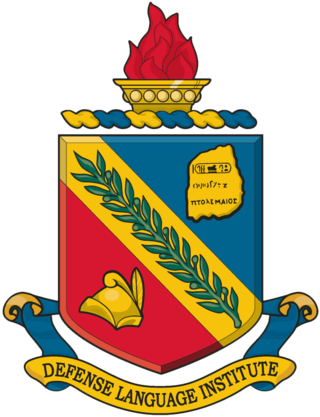An aptitude is a component of a competence to do a certain kind of work at a certain level. Outstanding aptitude can be considered "talent", or "skill". Aptitude is inborn potential to perform certain kinds of activities, whether physical or mental, and whether developed or undeveloped. Aptitude is often contrasted with skills and abilities, which are developed through learning. The mass term ability refers to components of competence acquired through a combination of both aptitude and skills.

The Armed Services Vocational Aptitude Battery (ASVAB) is a multiple choice test, administered by the United States Military Entrance Processing Command, used to determine qualification for enlistment in the United States Armed Forces. It is often offered to U.S. high school students when they are in the 10th, 11th and 12th grade, though anyone eligible for enlistment may take it.

The Defense Language Institute (DLI) is a United States Department of Defense (DoD) educational and research institution consisting of two separate entities which provide linguistic and cultural instruction to the Department of Defense, other federal agencies and numerous customers around the world. The Defense Language Institute is responsible for the Defense Language Program, and the bulk of the Defense Language Institute's activities involve educating DoD members in assigned languages, and international personnel in English. Other functions include planning, curriculum development, and research in second-language acquisition.
Cognitive tests are assessments of the cognitive capabilities of humans and other animals. Tests administered to humans include various forms of IQ tests; those administered to animals include the mirror test and the T maze test. Such testing is used in psychology and psychometrics, as well as other fields studying human and animal intelligence.
The Defense Language Proficiency Test (DLPT) is a battery of foreign language tests produced by the Defense Language Institute and used by the United States Department of Defense (DoD). They are intended to assess the general language proficiency of native English speakers in a specific foreign language, in the skills of reading and listening. An Oral Proficiency Interview (OPI) is sometimes administered to Defense Language Institute students to establish the graduate's proficiency in speaking following training there, but it is not part of the DLPT.

Cryptologic technician (CT) is a United States Navy enlisted rating or job specialty. The CT community performs a wide range of tasks in support of the national intelligence-gathering effort, with an emphasis on cryptology and signal intelligence related products.
Language learning aptitude refers to the "prediction of how well, relative to other individuals, an individual can learn a foreign language in a given amount of time and under given conditions". Foreign language aptitude itself has been defined as a set of cognitive abilities which predicts L2 learning rate, or how fast learners can increase their proficiency in a second or foreign language, and L2 ultimate attainment, or how close learners will get to being able to communicate like a native in a second or foreign language, both in classroom and real-world situations. Understanding aptitude is crucial for a complete picture of the process of second language acquisition. Knowledge about language aptitude has profound impacts in the field of Applied Linguistics, particularly in Second Language Acquisition (SLA) theory and in the practice of teaching and learning languages.
The Modern Language Aptitude Test (MLAT) was designed to predict a student's likelihood of success and ease in learning a foreign language. It is published by the Language Learning and Testing Foundation.
The Pimsleur Language Aptitude Battery (PLAB) was developed to predict student success in foreign language learning, or language learning aptitude, and for diagnosing language learning disabilities. It is published by the Language Learning and Testing Foundation.

Electrician's Mate is a United States Navy and United States Coast Guard occupational rating. The Electrician's Mate's NOS is B210.
The Army General Classification Test (AGCT) has a long history that runs parallel with research and means for attempting the assessment of intelligence or other abilities.

Vincent Memorial Catholic High School is a private, Roman Catholic high school in Calexico, California. It is located in the Roman Catholic Diocese of San Diego The school serves approximately 300 students.
The Interagency Language Roundtable (ILR) is an unfunded organization comprising various agencies of the United States federal government with the purpose of coordinating and sharing information on foreign language activities at the federal level.
Project 100,000, also known as McNamara's 100,000, McNamara's Folly, McNamara's Morons, and McNamara's Misfits, was a controversial 1960s program by the United States Department of Defense (DoD) to recruit soldiers who would previously have been below military mental or medical standards. Project 100,000 was initiated by Defense Secretary Robert McNamara in October 1966 to meet the escalating workforce requirements of the U.S. government's involvement in the Vietnam War. According to Hamilton Gregory, author of the book McNamara's Folly: The Use of Low-IQ Troops in the Vietnam War, inductees of the project died at three times the rate of other Americans serving in Vietnam and following their service had lower incomes and higher rates of divorce than their non-veteran counterparts. The project was ended in December 1971.

The Special Forces Qualification Course (SFQC) or, informally, the Q Course is the initial formal training program for entry into the United States Army Special Forces. Phase I of the Q Course is Special Forces Assessment and Selection (SFAS). A candidate who is selected at the conclusion of SFAS will enable a candidate to continue to the next of the four phases. If a candidate successfully completes all phases they will graduate as a Special Forces qualified soldier and then, generally, be assigned to a 12-men Operational Detachment "A" (ODA), commonly known as an "A team." The length of the Q Course changes depending on the applicant's primary job field within Special Forces and their assigned foreign language capability but will usually last between 56 and 95 weeks.
A foreign area officer (FAO) is a commissioned officer from any of the six branches of the United States Armed Forces who is a regionally focused expert in political-military operations. Such officers possess a unique combination of strategic focus and regional expertise, with political, cultural, sociological, economic, and geographic awareness. Foreign language proficiency is necessary in at least one of the dominant languages in their specified region.
According to Paul Muchinsky in his textbook Psychology Applied to Work, "mechanical aptitude tests require a person to recognize which mechanical principle is suggested by a test item." The underlying concepts measured by these items include sounds and heat conduction, velocity, gravity, and force.
The following outline is provided as an overview of and topical guide to second-language acquisition:
The Policy Aptitude Test (PAT) is an offline written test held in India. This test scores a person on the bases of General Knowledge, Numerical Problem Solving, Policy Aptitude, Logical Reasoning, English Language and Policy Analysis Ability. The National Law School of India University, Bengaluru (NLSIU) started this exam and use the test for selecting students for its Public Policy Programme. The test is conducted every year.





